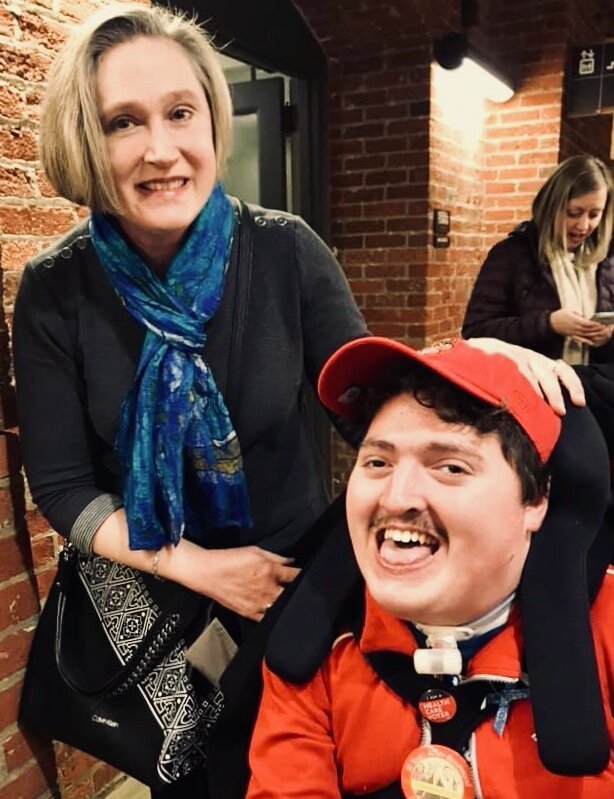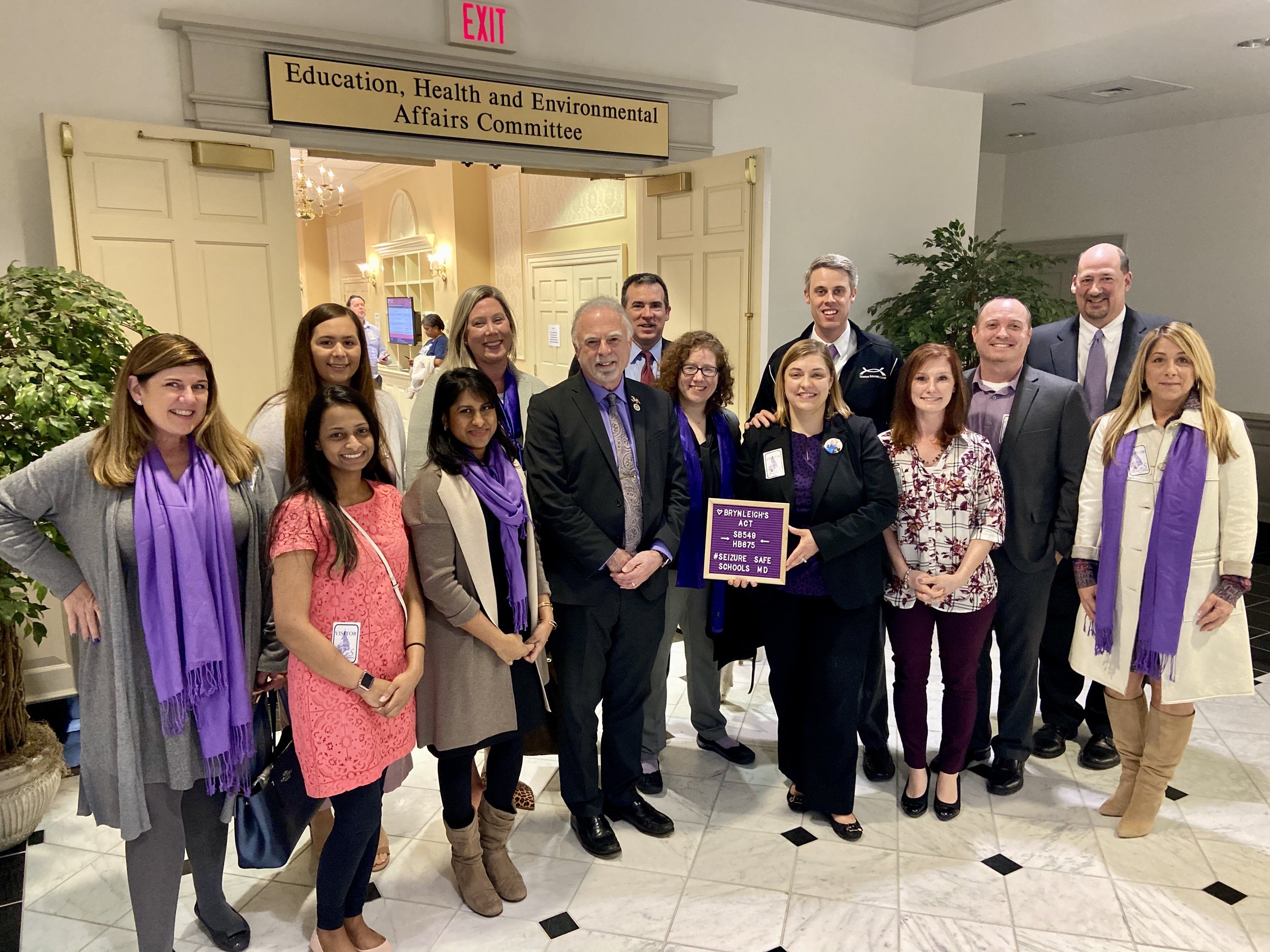Lauren & her daughter Ellie [image description: A mother and daughter with light skin and blond hair pose in front of a leafy backdrop. The daughter has her arms around her mother’s waist. She wears a sage-green dress and turquoise-frame eye glasses. The mom wears a navy blue dress with a tiny white pattern.]
We find ourselves celebrating our third consecutive World Down Syndrome Day (WDSD) against the backdrop of a global pandemic; though, undeniably, something has recently shifted. While much of the world, and certainly much of the United States, has decided that it is time to turn the page, close the book, and go back to “normal,” we are acutely aware, having loved ones with Down syndrome, that it isn’t that simple.
Covid-19 continues to post serious risks to people with Down syndrome and other disabilities, including the unfortunate likelihood of new variants. We also face the heightened challenge of protecting vulnerable members of society when commonsense public health measures like masking and vaccinations have become political weapons wielded in school board meetings and state legislatures.
We must also acknowledge all that has been lost, the trauma we have endured, and the long-standing inequities that have been revealed. School closures and virtual learning have had a devastating and disproportionate impact on the education of school-age children with disabilities including Down syndrome, with many families reporting significant learning loss, struggles to access greatly needed compensatory services, and increasing pressure to move their students with Down syndrome to more restrictive school placements. The situation is dire.
The serious labor shortage of Direct Support Professionals, a major problem before the pandemic, has now risen to crisis levels, threatening the ability of adults with Down syndrome and other disabilities to participate fully within their communities. And with life-saving therapies and critical healthcare resources in short supply throughout the pandemic, the healthcare discrimination faced by individuals with Down syndrome and other intellectual/developmental disabilities became more apparent than ever.
And yet, on this World Down Syndrome Day, we find much to celebrate. Our own daughters, Hope and Ellie, whose insistence on living in the moment – this moment right now – remind us of our own remarkable resilience as individuals, families, and communities. Their ability to notice joy in each moment and their grace in both acknowledging and experiencing the hurt and confusion, too, gives us, as their parents, the ability to experience such joy and grace as well. The Down syndrome community has found new ways, amidst great loss and isolation, to connect, maintain relationships, establish new routines, and learn new skills.
Liz & her daughter Hope [image description: A mother and daughter, both with light skin, pose outdoors. Behind them are green trees and blue sky with clouds. Both mom and daughter have dark hair and wear glasses. They are depicted from shoulders up.]
This year, we also celebrate our first year as co-chairs of the Maryland Down Syndrome Advocacy Coalition (MDAC), an organization that brings together self-advocates, families, professionals, and the five Maryland Down syndrome organizations, to advocate for legislation and policies that will improve the lives of individuals with Down syndrome across the state of Maryland. A year ago today, we came together as co-chairs and partners to revitalize MDAC in this moment of challenge and change. This model of statewide Down syndrome coalitions has been successful across the country and we are honored to be a part of the work here in Maryland as we partner with other advocacy organizations on a variety of issues impacting the disability community.
MDAC currently has two workgroups — a K-12 education workgroup and a workgroup focused on the issues faced by adults with Down syndrome. Each workgroup meets monthly and, with the ease and accessibility afforded by virtual meetings, we have representatives from across the state ready to share their stories, connect with their legislators, and unite around issues of concern. We are currently focusing on issues such as supported decision making, self-directed services, and inclusive education, particularly for students with significant cognitive disabilities.
We rely on the support of the National Down Syndrome Advocacy Coalition (NDAC), a member service of the National Down Syndrome Congress (NDSC), both as individual advocates and for guidance and support for our work with MDAC. We urge all of you to become more deeply involved in your own advocacy efforts by finding organizations and other advocates in your own states with whom you find common cause. We are grateful for the hope and energy we feel from coming together to tell our stories and work toward solutions to problems facing our community.
This World Down Syndrome Day, despite the challenges of the ongoing pandemic, we celebrate our children and feel fortunate to be part of a resilient Down syndrome community. We look forward to another year of organizing, advocating, and working shoulder to shoulder with self-advocates, families, Down syndrome organizations, and other advocates and organizations in the wider disability community to advance meaningful change for Marylanders with Down syndrome.
Forward with hope,
Liz and Lauren
Liz Zogby is the co-lead of the Maryland Down Syndrome Advocacy Coalition and a member of the Down Syndrome Association of Maryland (DSAmd), and leads advocacy efforts for the annual Step Up for Down Syndrome Baltimore walk event each October. Liz is the outreach coordinator for the Trace R&D Center at the University of Maryland, an accessibility research center that focuses on the intersection of information and communication technology and disability, as well as a freelance writer and researcher with particular expertise in survey research. She is the mom of three, including her youngest Hope (11) who has Down syndrome, and lives in Baltimore City.
Lauren Ochalek is a Down syndrome advocate, nurse educator, cancer thriver, wife, and mom (her oldest, Ellie, has Down syndrome). She is the co-lead of the Maryland Down Syndrome Advocacy Coalition and serves on the Board of Directors for the Down Syndrome Association of Maryland. Her heart beats for disability rights, legislative advocacy, and promoting meaningful inclusion.














![Payton (center) with her dad, Randal (left), and her mom, Kristen (right). [image description: A dark-skinned man in a navy blue shirt holds his daughter, who had tan skin and is wearing a pink dress and a pink and white hair bow. The girl’s mother, a white-skinned woman is to the right with long straight brown hair and glasses.]](https://images.squarespace-cdn.com/content/v1/59d8124080bd5eadd869b8b7/1628715929675-Q2WDGYTG8YAPT5XO07XZ/Payton+w+mom+%26+dad.JPG)
![Payton (right) with her dad (left). [image description: A dark-skinned man wearing a knit cap and brown plaid shirt holds his young daughter, who has tan skin and is wearing an aqua jacket. She is looking at bright stained-glass windows.]](https://images.squarespace-cdn.com/content/v1/59d8124080bd5eadd869b8b7/1628716165821-L2205KQJCXJHIPIRYKGR/Payton+%26+dad.JPG)
![Brynleigh Shillinger [image description: A young girl with dark hair and a purple hair bow poses in a wicker outdoor chair with teal cushions. She holds a purple sign that reads “Brynleigh’s Act, SB225, HB370, #Seizure Safe Schools MD.”]](https://images.squarespace-cdn.com/content/v1/59d8124080bd5eadd869b8b7/1614877315486-42JYPTE52UMFZW9WLF9M/Brynleigh.jpg)
![The Shillinger Family. [A father poses in white shirt and purple tie, a mom holds her daughter—both mother and daughter are wearing deep blue clothing.]](https://images.squarespace-cdn.com/content/v1/59d8124080bd5eadd869b8b7/1614877457541-MYFDHQ3CT62D2KDN3XFA/Shillinger+Family.jpg)

![Jeneva & her son Rob [image description: A mom with short blonde hair wears a blue scarf & grey dress. Her son is seated in a wheelchair with an orange shirt & orange baseball cap.]](https://images.squarespace-cdn.com/content/v1/59d8124080bd5eadd869b8b7/1614877746207-JTGO1B3ZGKXQUXWZYMCO/JenevaAndRobert._JWJjpeg.jpeg)



























